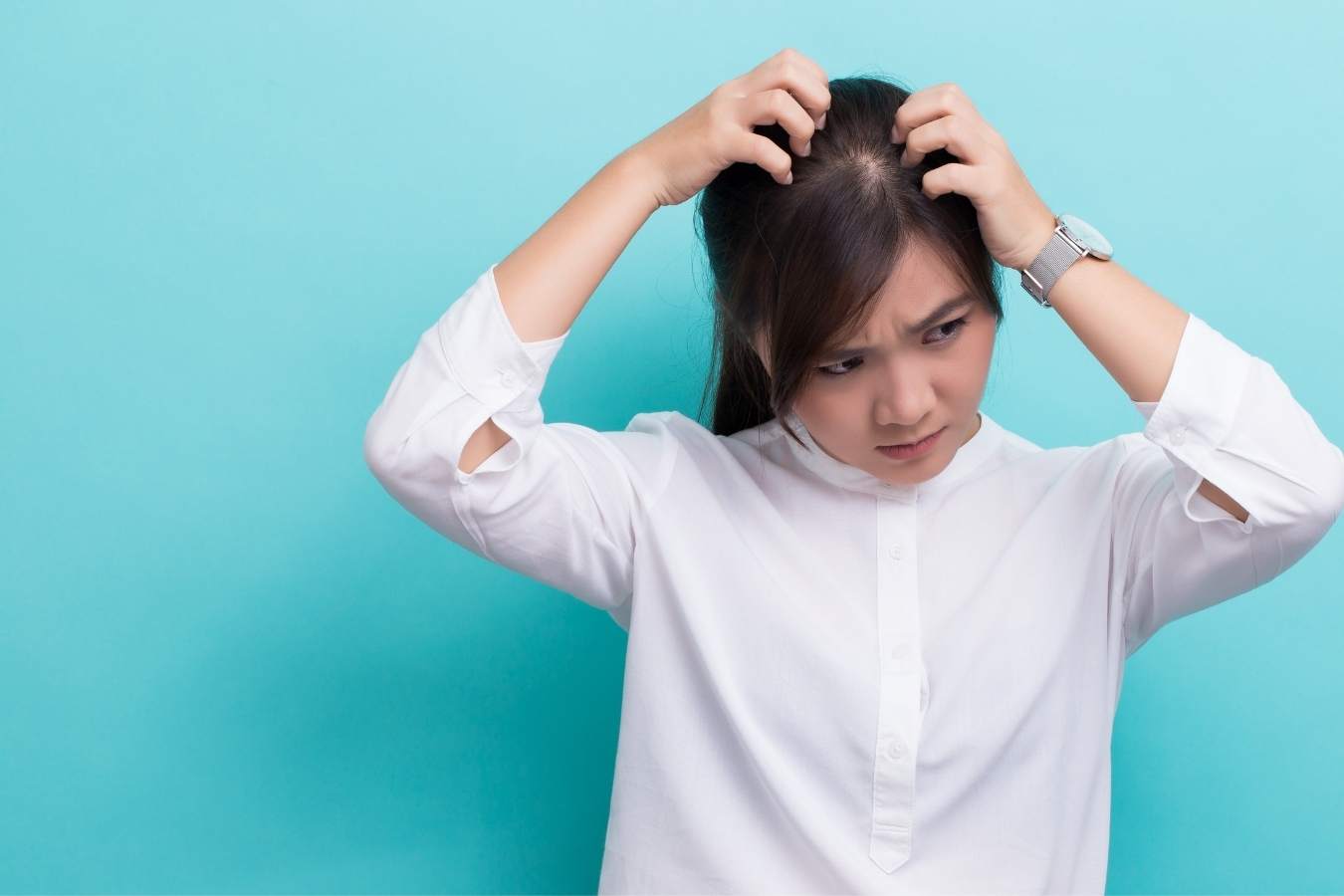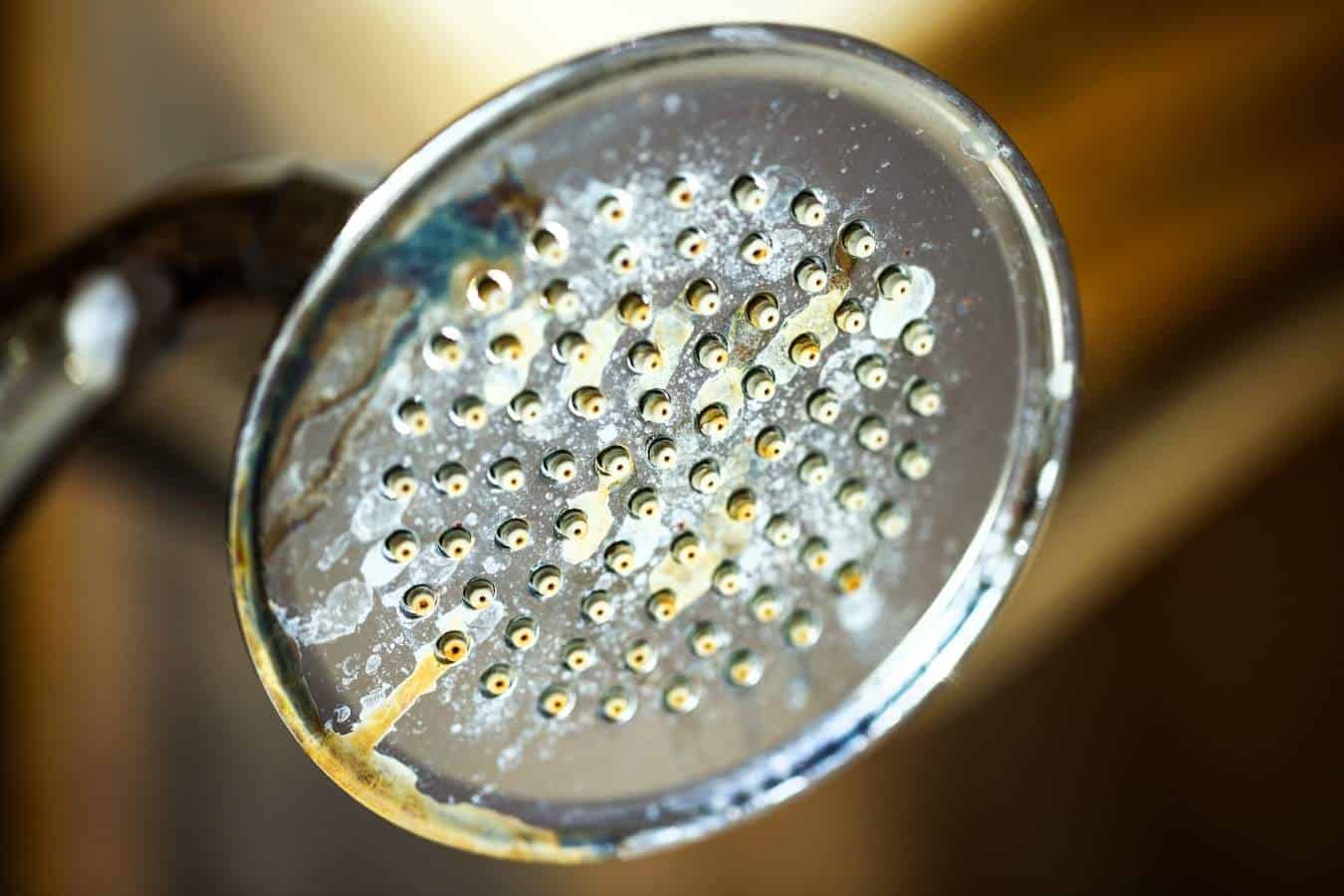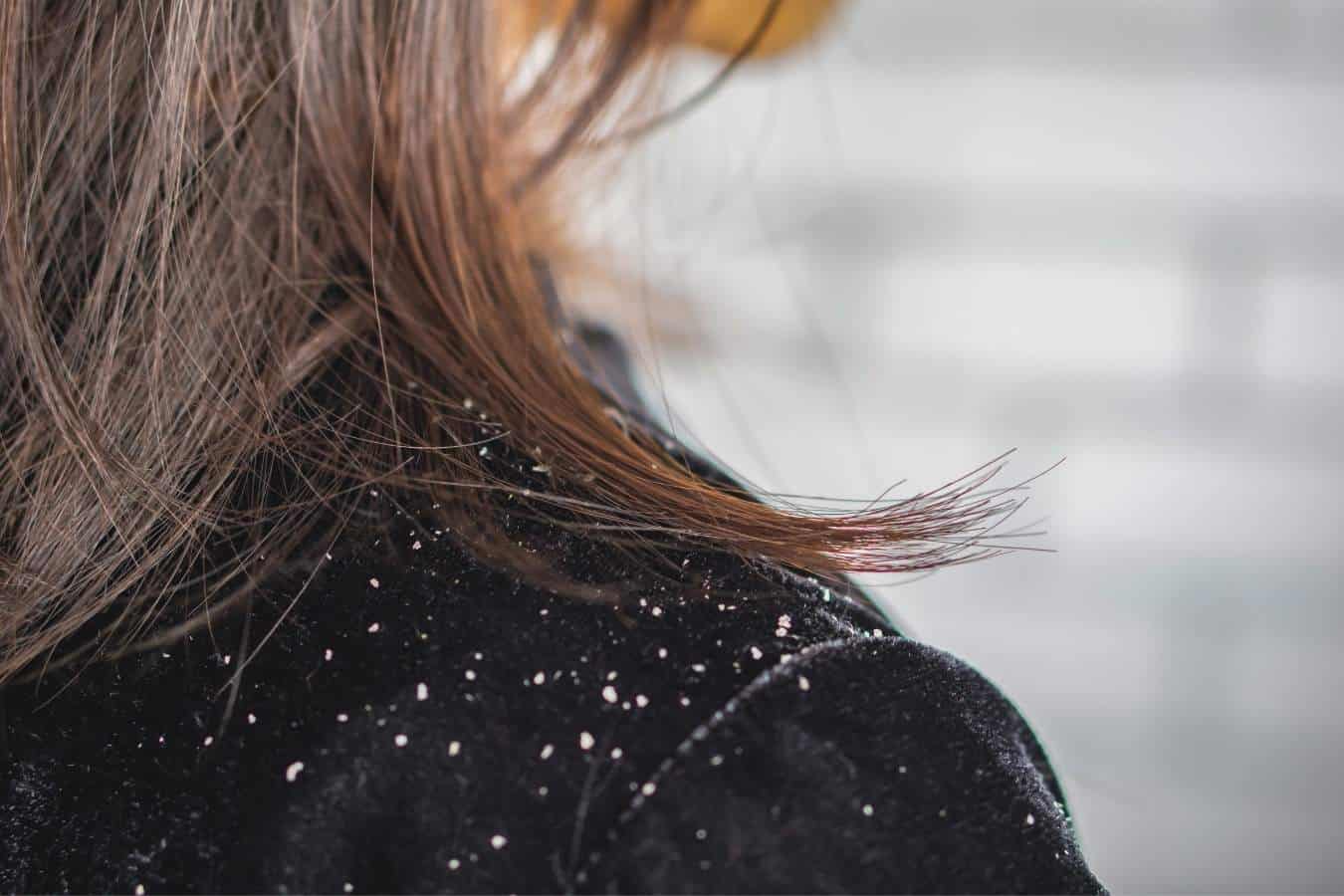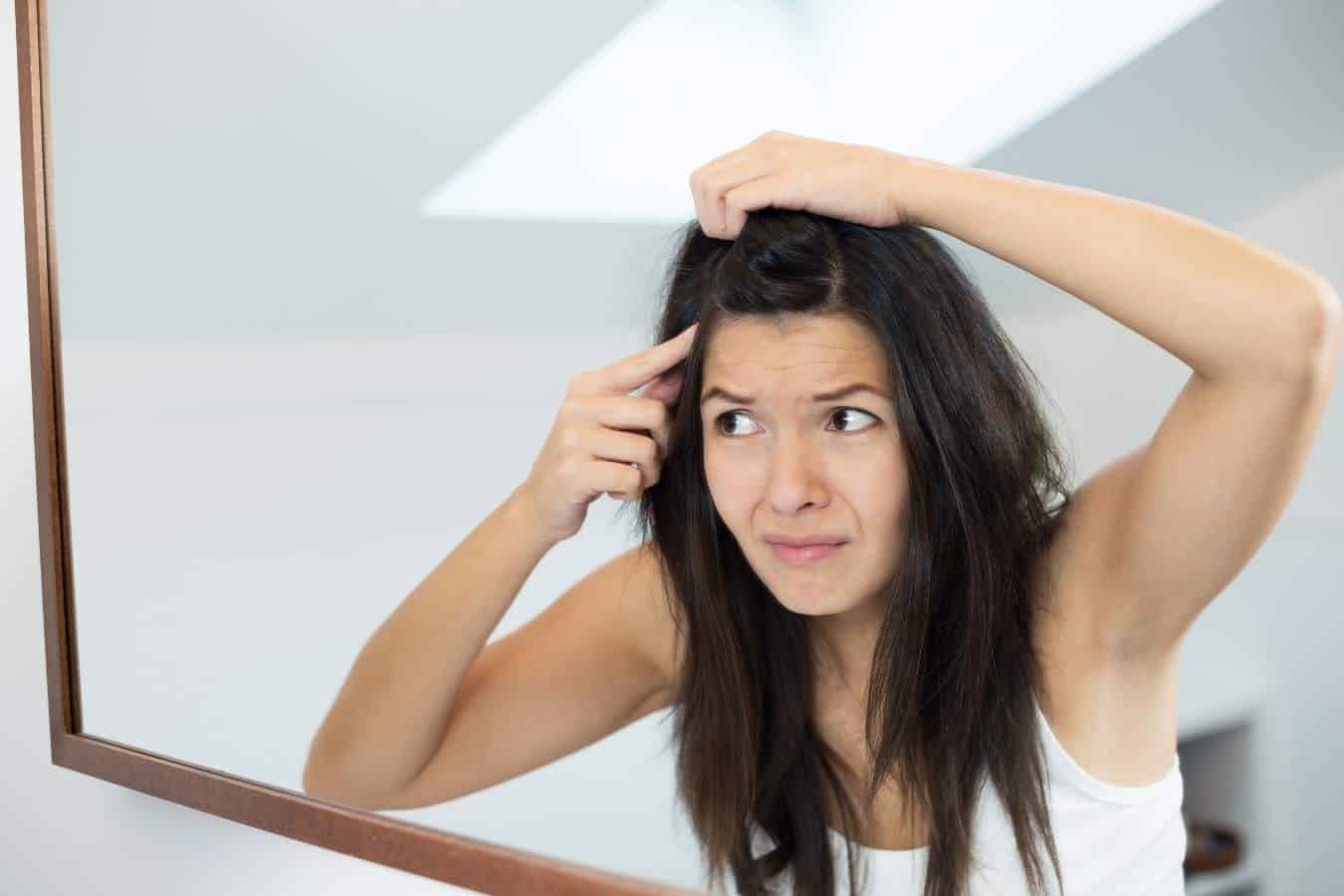Hard water not only causes a build-up of scale in pipes and boilers, but it can potentially cause a build-up of scale on your scalp. In this guide, we provide the answer to whether hard water causes dandruff.

Hard water can cause dandruff and a dry, itchy scalp. That’s because it contains calcium and magnesium salts that build up in your hair and mix with residue from soap, shampoo, or conditioner. A water softener shower head helps prevent this issue, while apple cider vinegar and clarifying shampoo can remove the residue.
What Is Hard Water?
Hard water is water with high mineral content.
Hard water mainly contains calcium carbonate and magnesium sulfate. These mineral salts dissolve in rainwater when it flows through rocks and soil.
While you can’t always see the dissolved minerals in clean water, these tell-tale signs indicate water hardness:
- Mineral deposits, unsightly spots, and cloudiness on dishes, cutlery, and glassware
- Limescale build-up in sinks, bathtubs, and even your coffeemaker
- Water that makes your hands feel slimy after washing with soap
- Using more detergent or soap to clean
- Formation of scum when you use soap
When used on hair, hard water will also make your hair look and feel different, but not in a good way.
What Does Hard Water Do To Your Hair?

From a scientific standpoint, there are conflicting results about the effects of hard water on hair.
For instance, a study that included 70 male participants was conducted to determine the impact of hard water on hair strength.
The study concluded that hard water weakens hair and promotes hair breakage.
On the other hand, another study used 10-15 hair strands from 15 female volunteers.
Some strands were soaked in hard water, while others were washed in distilled water.
The researchers then measured each hair’s tensile strength and elasticity, and the results indicated that the hardness of water did not affect hair strength and elasticity.
But still, it’s hard to ignore the effects of hard water, not just on your hair but on different parts of the home.
As mentioned, hard water causes limescale build-up and leaves a film on your hands.
The same film will also coat your hair strands, potentially preventing your hair from absorbing moisture. This can cause dryness, brittleness, frizz, and split ends.
Other negative effects of hard water on hair include dullness, thinness, tangling, breakage, and brassiness.
Hard water is also annoying because it doesn’t bind properly to shampoos, so it’s challenging to remove the build-up.
You have to use an excessive amount for your hair to feel clean enough.
Can Hard Water Cause Dandruff?

Dandruff is a condition that causes the skin on the scalp to flake. While it’s not a serious condition, it can be unsightly and embarrassing to deal with.
In addition, it can get uncomfortable when your scalp gets itchy. Hard water can cause dandruff because all the dissolved salts eventually build up on your scalp.
The dissolved salts mix with your shampoo and hair products, leaving a flaky residue.
The flaky residue isn’t technically dandruff since the flakes are mainly composed of hair care products and mineral salt build-up.
However, hard water can also cause an excessive amount of dead skin cells to fall off.
The flaking is due to inflammation and is usually associated with seborrheic dermatitis, which causes scaly patches, skin irritation, and dandruff.
One study showed that hard water could increase sodium lauryl sulfate deposits on the skin after washing.
These deposits increase skin irritation and may ultimately increase the development of atopic dermatitis.
Does Hard Water Cause Dry Scalp?
Hard water causes skin dryness. That’s because hard water might damage the skin’s protective barrier, responsible for moisture retention.
When this barrier is compromised, your scalp can’t lock in water and becomes dry and damaged.
The high amount of calcium and magnesium will clog pores and irritate your skin.
When mixed with shampoo, soap, or conditioner, these salts also leave a filmy layer on your scalp.
Unfortunately, that means the more you wash, the more scum you leave in your hair. The build-up is hard to wash off but will easily flake off once it’s dry.
Dry scalp can cause dandruff, so you’ll notice visible flakes falling from your scalp.
In this case, the dryness is not caused by a fungal infection.
Instead, it happens because the scalp doesn’t have enough moisture. Without enough water, it’s impossible to have a healthy scalp and hair.
That’s why dry scalp is commonly linked to itchiness, dandruff, soreness, and even hair loss. Fortunately, it can be treated with moisturizing oils like coconut oil and jojoba oil.
Does Hard Water Cause Dry Hair?

Hard water doesn’t just dry out your scalp. It also dries out your strands.
Again, it all comes down to the high amount of calcium and magnesium found in hard water. As mentioned, the mineral salts leave a film that makes it difficult to shampoo your hair properly.
Any soap you use on your hair will stick to your strands, drying them and leading to other problems.
It may also be challenging to moisturize your strands if residue sticks to your hair like a film.
If you have colored hair, the situation becomes worse because hard water will cause more damage.
Colored hair quickly becomes dull and discolored.
It’s not uncommon to have colored hair develop brassiness or a green hue. Overall, dry hair caused by water hardness is prone to breakage, thinness, and split ends.
Is Soft Water Better For Dry Hair?
Sometimes hard water is difficult to avoid, depending on the region you live in.
Some areas naturally have higher levels of hard water, while other areas have “softer” water.
Using soft water on your hair is the best long-term solution if hard water is causing your hair to dry.
For most people, this involves installing a water softener shower head. A water softener contains carbon that significantly reduces the number of minerals in hard water.
This leaves you with water that’s less damaging and healthier for your hair and scalp.
How To Keep Hair Healthy With Hard Water
Installing a water softener can be expensive, so it’s not always a viable solution if you’re dealing with hard water.
The good news is, there are several ways to prevent hard water from affecting the health of your scalp and hair:
Use A Clarifying Shampoo
A clarifying shampoo is more effective at stripping the build-up from hard water.
For best results, use a sulfate-free clarifying shampoo at least once a week to remove residue and combat itchiness, dullness, and heaviness.
Using the right clarifying shampoo will help keep your hair moisturized and shiny.
Try An Apple Cider Vinegar or Citrus Rinse
If you want a home remedy to hard-water hair problems, then apple cider vinegar or lemon juice is more up your alley.
Both substances are acidic and capable of removing mineral build-up from your hair.
The low pH also helps restore your scalp’s pH balance and closes your hair cuticles, giving your locks more shine and softness.
Use Moisturizing Treatments
Moisturizing treatments help to combat the drying effects of hard water.
They seal in moisture, ensuring that your hair feels soft and looks glossy.
Most hair experts recommend deep conditioning your hair at least once or twice a week with a deep conditioner or hair mask.
You can also use more natural oils like jojoba oil, argan oil, and coconut oil to deeply moisturize your locks.
Rinse With Filtered Water
If you wash your hair with hard water, you can minimize the damage by doing a final rinse with store-bought filtered water.
This is less expensive than installing a water softener because you’ll need less water for the final rinse after washing your hair.
Disclaimer: This site is not intended to provide professional or medical advice. All of the content on LovedByCurls.com is for informational purposes only. All advice should be followed at your own discretion. Ingredients may change at any time so always check the product label before using. Check our full disclaimer policy here.
